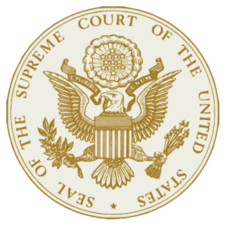Arizona v. United States
 | |
| Arizona v. United States | |
| Reference: 567 U.S. 387 | |
| Term: 2012 | |
| Important Dates | |
| Argued: April 25, 2012 Decided: June 25, 2012 | |
| Outcome | |
| United States Court of Appeals for the Ninth Circuit affirmed in part and reversed in part | |
| Majority | |
| John Roberts • Anthony M. Kennedy • Ruth Bader Ginsburg • Steven G. Breyer • Sonia Sotomayor | |
| Dissenting | |
| Antonin Scalia • Clarence Thomas • Samuel Alito | |
Arizona v. United States is a case decided on June 25, 2012, by the United States Supreme Court holding that states may not implement their own immigration laws. The case concerned Arizona's immigration-related law SB 1070, enacted in 2010. At issue was whether federal immigration law preempts state immigration law.
In a 5-3 decision, the court held that federal law preempted three provisions of Arizona's law:[1]
- The provision making it a state crime to reside in the country without legal permission
- The provision making it a state crime to work in the country without legal permission
- The provision allowing law enforcement officers to arrest individuals without a warrant based on probable cause of unlawful presence
The court ruled that the first provision conflicted with federal provisions already in place, while the second and third provisions were preempted because they interfered with federal authority over immigration law.
Background
In 2010, Arizona enacted a state law, SB 1070, that contained four primary provisions related to immigration:[1]
- The first provision made it a state crime to reside in the United States without legal permission.
- The second provision made it a state crime to work in the United States without legal permission.
- The third provision required law enforcement officers to verify the legal status of all individuals who were arrested or detained.
- The fourth provision allowed law enforcement officers to arrest individuals without a warrant based on probable cause of unlawful presence.
The United States government challenged the law in federal district court before the law went into effect, seeking to stop its enforcement. The government argued that Arizona's law usurped federal authority over the enforcement of immigration law. In its ruling, the district court blocked the four provisions listed above. Arizona appealed to the United States Court of Appeals for the 9th Circuit. The appellate court affirmed the ruling of the district court, finding that the United States had demonstrated that federal immigration law likely preempted the four provisions of SB 1070 at issue.[1][2]
Arizona further appealed the case to the United States Supreme Court, which granted certiorari on December 9, 2011.[1]
The court limited oral arguments to the following question:
|
Oral argument
Oral argument was held on April 25, 2012. The case was decided on June 25, 2012.[1]
Decision
In a 5-3 decision issued on June 25, 2012, the Supreme Court held that the first, second, and fourth provisions of SB 1070 were preempted by federal immigration law. The majority opinion was written by Justice Anthony Kennedy, who was joined by Chief Justice John Roberts and Justices Ruth Bader Ginsburg, Stephen Breyer, and Sonia Sotomayor. Justices Antonin Scalia, Clarence Thomas, and Samuel Alito each wrote separate dissenting opinions. Justice Elena Kagan recused herself from the case.
Opinions
Opinion of the court
|
|
|
|
|
|
In its opinion, the Supreme Court ruled that the federal government has "broad, undoubted power over immigration and alien status," which precluded three provisions of SB 1070. However, the court also found that the lower courts had erred in deciding that federal law also preempted Arizona's requirement for law enforcement officers to verify the legal status of all arrestees and detainees.[1][2]
- The section of SB 1070 that made it a state crime to reside in the country without legal permission was preempted because it conflicted with federal provisions already in place governing the legal immigration process.
- The section that made it a state crime to work in the country without legal permission was preempted because it imposed criminal penalties on such individuals in direct conflict with federal law.
- The section that allowed the warrantless arrest of individuals based on probable cause of unlawful presence was preempted because it obstructed the federal government's authority over determining when to arrest an individual residing in the country without legal permission.
The provision requiring the verification of the legal status of all arrestees and detainees was not preempted because the court found no evidence that such a provision conflicted with or obstructed federal law enforcement. The opinion noted that the provision contained "three limitations that protect individual rights: a detainee is presumed not to be an illegal alien if he/she produces a valid Arizona drivers license; an officer may not consider race, color, or national origin during a check; and the check must be implemented in a manner consistent with federal law."[1][2]
The decision of the U.S. Court of Appeals for the Ninth Circuit was affirmed in part, reversed in part, and remanded for further consideration. Kennedy wrote the following in the court's majority opinion:[2]
| “ | The National Government has significant power to regulate immigration. With power comes responsibility, and the sound exercise of national power over immigration depends on the Nation's meeting its responsibility to base its laws on a political will informed by searching, thoughtful, rational civic discourse. Arizona may have understandable frustrations with the problems caused by illegal immigration while that process continues, but the State may not pursue policies that undermine federal law.[4] | ” |
| —Justice Anthony Kennedy[2] | ||
Dissenting opinions
|
|
|
|
The dissenting justices included Justice Antonin Scalia, Justice Samuel Alito, and Justice Clarence Thomas, each of whom wrote separate opinions concurring in part and dissenting in part.
In his opinion, Justice Scalia wrote that none of the four provisions of SB 1070 in question were preempted by federal law, but rather helped enforce the law more effectively. Scalia also argued that invalidating the provisions undercut the sovereignty of the states:[1]
| “ | Today's opinion, approving virtually all of the Ninth Circuit's injunction against enforcement of the four challenged provisions of Arizona's law, deprives States of what most would consider the defining characteristic of sovereignty: the power to exclude from the sovereigns territory people who have no right to be there.[4] | ” |
| —Justice Antonin Scalia[2] | ||
Justice Thomas concurred with Justice Scalia that federal law did not preempt Arizona's SB 1070, but wrote that he came to that conclusion "for the simple reason that there is no conflict between the 'ordinary meanin[g]' of the relevant federal laws and that of the four provisions of Arizona law at issue here." Justice Alito, in his opinion, agreed with the majority opinion that the first provision was preempted, while the third provision was not. However, he disagreed that federal law also preempted the second and fourth provisions, finding that regulating employment laws is a state concern and that the authority granted to law enforcement under the fourth provision was consistent with federal law.[2]
Impact
| Federalism |
|---|
| •Key terms • Court cases •Major arguments • State responses to federal mandates • Federalism by the numbers • Index of articles about federalism |
Arizona v. United States established that states may not implement their own immigration laws. State law enforcement officers are authorized to inquire about a resident's legal status during lawful encounters, but they cannot enforce immigration laws that are preempted by federal law.
See also
- The Roberts Court
- Supreme Court of the United States
- History of the Supreme Court
- Federalism
- Arizona SB 1070
- Illegal immigration
- Immigration in Arizona
External links
- Full text of the case syllabus and opinions (Justia)
- Supreme Court of the United States
- Search Google News for this topic
Footnotes
- ↑ 1.0 1.1 1.2 1.3 1.4 1.5 1.6 1.7 Oyez, "Arizona v. United States," accessed February 3, 2017
- ↑ 2.0 2.1 2.2 2.3 2.4 2.5 2.6 Legal Information Institute, "Arizona et al. v. United States - Syllabus," accessed February 5, 2017
- ↑ Supreme Court of the United States, "11-182 ARIZONA V. UNITED STATES," accessed February 3, 2017
- ↑ 4.0 4.1 Note: This text is quoted verbatim from the original source. Any inconsistencies are attributable to the original source.
| |||||







